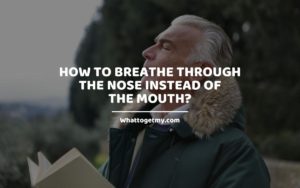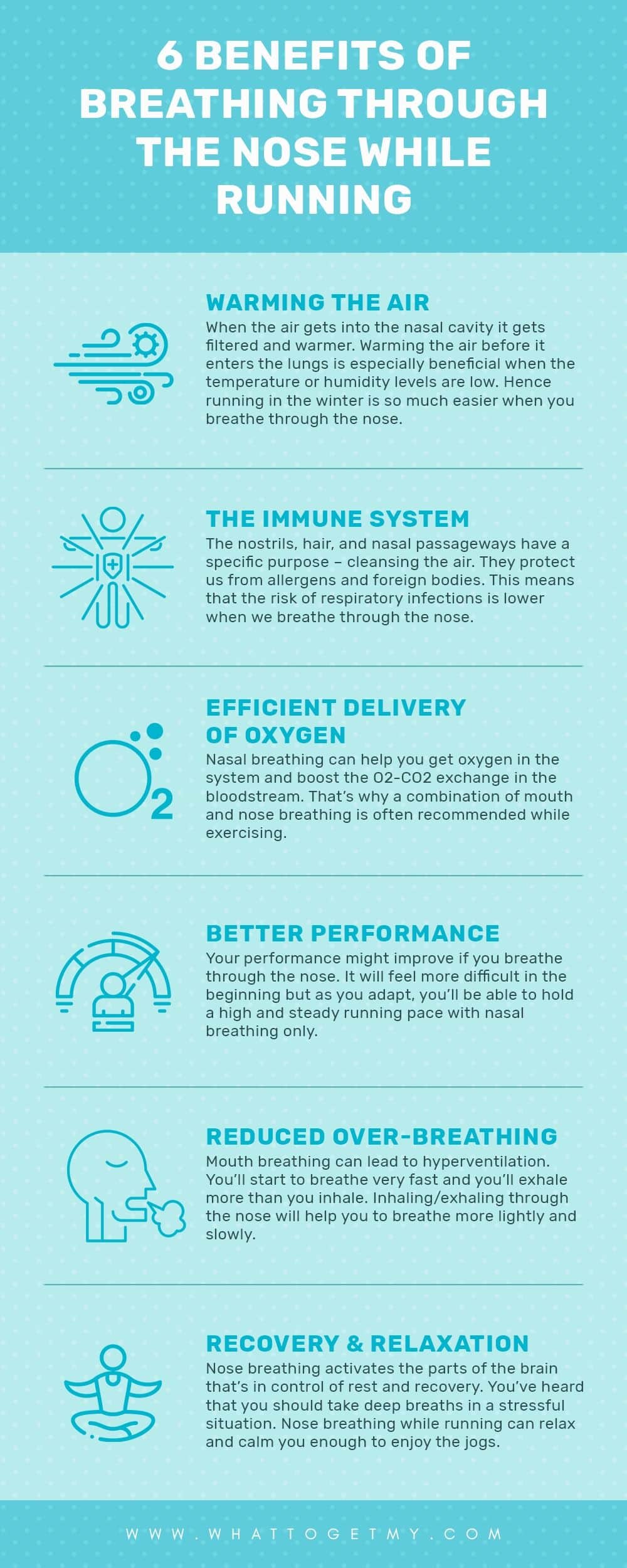6 Benefits of Breathing Through the Nose While Running
WhatToGetMy Instructional Article
We all know that nasal breathing is better than mouth breathing in general but is it the same while you’re exercising? Are there more benefits of breathing through the nose while running? Sure cardio exercise is healthy on its own but it becomes even better (and easier) with proper breathing techniques.
The most efficient way to breathe is, however, by using your stomach. It doesn’t matter that much whether you’re using your mouth or your nose as long as you’re engaging your diaphragm instead of your chest. It gets tough to try deep belly breathing while the intensity of the exercise increases. People just “switch” to shallow chest breathing. You need to be focused on the way you take air in to achieve maximum effects of running.
The most commonly discussed topic among runners is nose vs mouth breathing. We just have three important remarks:
- Opinions vary – some people say that breathing through the mouth feels more “natural” while running and that you can take more air in that way. Others try to point out the benefits of nasal breathing. In the end, it’s all about forming a habit. You can easily start breathing through the nose if you choose to.
- A lot of runners choose to breathe both through the mouth and nose because they want to maximize air intake. Before you decide what works best for you, try researching this topic a lot. In this article, we’ve listed all the benefits of nose breathing, but you need to keep searching. Ask your doctor or a fitness instructor for additional opinions. You should always try to get as much useful information as possible.
- The bottom line is that stomach breathing is the best thing you can do while exercising. Whether you use your mouth or your nose to take air in, you need to breathe with your diaphragm and not with your chest.
What happens during exercise?
Why do we breathe harder when we exercise? It’s simple actually. When you’re running and picking up the pace, your heart rate and breathing increase. The faster you run, the harder it becomes for you to breathe because your heart starts pumping blood faster, and the demand for oxygen increases. Your body also wants to get rid of carbon dioxide faster and pushes you to either breathe faster or take deeper breaths.
Your nose can’t take in a lot of air, so your body switches to mouth as a source. Although you can continue with mouth breathing, it’s advised to slow down your pace to the point where you can breathe through your nose without gasping for air or panicking.
Benefits of nose breathing
Source Link: https://whattogetmy.com/benefits-of-breathing-through-nose-while-running/
Warming the air
When the air gets into the nasal cavity it gets filtered and warmer. Warming the air before it enters the lungs is especially beneficial when the temperature or humidity levels are low. Hence the running in the winter is so much easier when you breathe through the nose.
The immune system
As we said, the nose also filters the air. The nostrils, hair, and nasal passageways have a specific purpose – cleansing the air. They protect us from allergens and foreign bodies. This means that the risk of respiratory infections is lower when we breathe through the nose.
The mouth doesn’t have a defense system. Its role is to start the digestive process and taking in air is only secondary. If you want to be more protected, especially if you’re asthmatic or have allergies, you should definitely try nasal breathing during exercise.
Efficient delivery of oxygen
There’s a huge difference between breathing through the nose and mouth. Breathing with your mouth allows you to get more air into your lungs faster. However, your body can’t exchange oxygen for carbon dioxide fast enough. Your body experiences stress and forces hyperventilation. Nasal breathing can help you get oxygen in the system and boost the O2-CO2 exchange in the bloodstream. That’s why a combination of mouth and nose breathing is often recommended while exercising.
Nasal breathing provides less air and your breathing tends to be slower. However, some studies show that a lower breath rate allows more time for oxygen to enter the bloodstream. Your tissues will still get much-needed oxygen and the exchange between molecules happens regularly.
Better performance
This is, as we said, still debated a lot in the running community. Breathe through the nose or mouth while running is a personal choice in the end. However, some people argue that your performance might improve if you breathe through the nose. It will feel more difficult in the beginning but as you adapt, you’ll be able to hold a high and steady running pace with nasal breathing only.
Reduced ‘over-breathing’
We already mention that mouth breathing can lead to hyperventilation. You’ll start to breathe very fast and you’ll exhale more than you inhale. Inhaling/exhaling through the nose will help you to breathe more lightly and slowly. You won’t feel the need to take more breaths in and your O2 and CO2 levels in your bloodstream will be balanced.
Recovery and relaxation
What is the main advantage of breathing through the nose rather than the mouth? Nose breathing activates the parts of the brain that’s in control of rest and recovery. You’ve heard that you should take deep breaths in a stressful situation. It’s the same when running. This is a stressful situation for your body. Nose breathing while running can relax and calm you enough to enjoy the jogs. Not only will you be relaxed emotionally but you’ll be able to recover physically after exercise with ease.
What should we do
When you’re running at low intensity, try to breathe through the nose. You can even try some of the recommended breathing techniques while exercising like taking deep breaths or inhaling through the nose and exhaling through the mouth.
Always concentrate on your breathing. Close your mouth and breathe only through the nose in the beginning. If you feel anxious or you’re struggling to breathe, you can either open your mouth and mix nose and mouth breathing, or you can slow your pace so you can breathe through the nose without struggles.
It takes some time to get used to the different breathing routines but you can’t give up. You just need to maintain a healthy balance between struggling for air and running too slow. Your pace should put you just on the edge of discomfort. You need to push your body to the limits but not cross your boundaries, so you don’t experience burnout.
Note that if you find it very difficult to breathe through the nose, even if running very slowly, you might have clogged nostrils. It’s possible that you have a deviated septum or an allergy problem that prevents you from breathing through the nose. In this case, consider asking your doctor for additional advice.
Sustained-pace breathing
As we said, when you’re running at a sustainable pace, you can get oxygen with your nose only without any problems. You can monitor your pace with a watch or a phone app. If you don’t have a fitness tracker, just listen to your body. You’ll know that you’re running at a sustainable pace if you can carry a conversation while running without gasping for air.
For faster runs like sprints, you might also need to use your mouth to breathe. However, for longer sustained runs you need to keep a steady pace slower, so you can comfortably breathe through the nose (and exhale through the mouth).
Stomach breathing
Instead of thinking about the reasons why you should breathe through the nose, focus on stomach breathing. If you want to get the most of your exercise you need to engage your full lung capacity. Diaphragmatic breathing enables you to take much more air in than you can with shallow chest breathing.
Start practicing breathing from your stomach when you’re not exercising. Take a deep breath and watch your stomach expand. You can put your hand on your stomach to feel it moves. Your diaphragm then forces the air in and out of your lungs. Your chest and shoulders should remain mostly still. Once you masterest belly breathing while your body is at rest, you can try it the next time you’re exercising.
It’s more important to use your diaphragm for effective oxygen intake than you focus on nose vs mouth breathing. For starters, you can breathe in through the nose and exhale through the mouth. Just keep your concentration on your stomach expanding during inhaling while your chest is staying still. Forming a good breathing routine is the first step for starting running if you’re out of shape. Everything else becomes easier after that, trust us.
Running and breathing tips
In addition to diaphragmatic breathing, we have some more tips for breathing while running.
- Focus on your form. The entire body can be used to support efficient breathing. Keeping a good posture will also help you run easier. Relax your shoulders but avoid hunching forward. Keep your head in line with your spine and always engage your core muscles.
- Find your breathing rhythm. If you follow a certain breathing pattern, you’ll be more focused on your breathing and it will become easier to get through the runs. You can exhale once your foot impacts the ground. Alternate your exhales between your right and left foot and use a 3:2 pattern (inhale for 3-foot impacts and exhale for two). If you’re running at a faster pace, try a 2:1 pattern. This might seem complicated at first but once practiced, you’ll do it naturally.
- Take in the fresh air. Forget about your treadmill and go outside. It’s always better to run in nature and inhale fresh air. If you can’t find enough green areas and you need to run in town, avoid busy roads and choose the time with low traffic.
- If you have asthma you might want to be a bit more careful with running. Avoid running in the cold weather because the lack of humidity can trigger your symptoms. Certainly, you shouldn’t run in areas packed with pollen. Also, morning runs (especially after rains) aren’t the best thing for you.
Frequently asked questions
How are you supposed to breathe when you run?
The best way to breathe while running is by using both your nose and mouth combined. Both nasal and mouth breathing can engage your diaphragm for maximum oxygen intake.
Why do I get tired so fast when running?
Many runners get tired too fast because they don’t keep a steady pace. They force a much faster face, so they end up gasping for air. You need to maintain a steady, comfortable pace. This doesn’t mean you should run too slow but it means you should find a balance. Keep yourself just on the edge of your comfortable pace.
How can a beginner run longer?
Regular training (at least 3 times a week) is the key to getting in shape. Find a beginners’ program that consists of both walking and running intervals. Keep a low running pace and in time you’ll be able to run for longer periods.
How do you know when to stop running?
Listen to your body. If you’re experiencing pain that only gets worse while you run, that’s a clear sign that you should stop. Just don’t confuse injury signs and regular tiredness.
Conclusion
As you can see there are a lot of benefits of breathing through the nose while running. You should definitely try the combination of nasal and mouth breathing for maximum effects. For successful running, however, it’s more important to have the motivation to exercise. Once you have the will for it, you can easily adapt any kind of breathing technique to fit your style of running.
Just keep researching to find what works for you. Once you have the basics figured out, you can start running, even if you think you hate it.
01 HOUR 29 MINUTES
ESTIMATED TIME DESIGNING AND UPLOADING THIS ARTICLE
07 HOURS 14 MINUTES
ESTIMATED TIME RESEARCHING AND WRITING THIS ARTICLE
You Might Also Like

How to Get Motivated to Exercise When You’re Depressed?
How to Get Motivated to Exercise When You’re Depressed? WhatToGetMy Instructional Article Let’s start by underlining that depression is a serious illness that causes a persistent feeling of sadness and loss of interest. The best way to help yourself is to talk to a therapist.

10 Benefits of Families Exercising Together
Benefits of Families Exercising Together WhatToGetMy Instructional Article Everyone keeps talking about a healthy lifestyle and the importance of working out. We want to say more about the benefits of families exercising together because family fitness is not that common. Exercise is for every type

25 Weight Lifting Gift Ideas For Powerlifters And Weightlifters
Powerlifters and weightlifters have specific clothing needs which you may be unaware of, and this is why buying them powerlifting training gear is not advisable. The best gifts are powerlifting equipment and accessories and some personalized and funny gifts. Our gift list of 25 Weight

How to Study Late at Night and Wake up Early?
How to Study Late at Night and Wake up Early? WhatToGetMy Instructional Article If you want to know how to study late at night and wake up early, we’ve got some advice for you. Time management is crucial for tackling all obstacles in front of

How to Breathe Through the Nose Instead of The Mouth?
How to Breathe Through the Nose Instead of The Mouth? WhatToGetMy Instructional Article If you learn how to breathe through the nose instead of the mouth, you’ll solve the problems with your sleep. There would be no more snoring or waking up in the middle

Fitness Activities for Elementary Students
Top Fitness Activities For Elementary Students WhatToGetMy Instructional Article Are you a parent that is looking for elementary fitness activities that they can do at home? Do you feel like your kids don’t do enough activities at school or you are looking for something to



